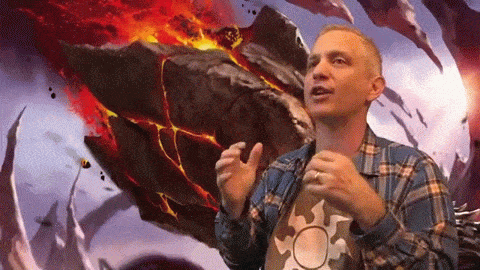A quick one this time around. There’s a couple of things I want to show you, in the wake of No Man’s Sky.
If you’ve been reading us here at AYB for a while, you know that I play a lot of Magic: the Gathering. And one thing about Magic that I love is the accountability of Mark Rosewater, its head designer.
Every year, Rosewater does a “State of Design” column, where he looks back at the past year in Magic and reflects on what went right, and what went wrong. He’s the face of the game, so he often includes more marketing talk than is strictly necessary, but his State of Design columns are nevertheless unflinching.
Magic releases four expansions a year — a large fall set, a small winter set, a large spring set, and a small summer set. The game typically relies on the large fall set to set the tone for the next year — and Battle for Zendikar, the big fall set for 2015, was a complete flop in terms of design. It was utterly boring to draft, had only one or two cards show up in tournament decklists, and — criminally — featured “devoid”, a mechanic that did literally nothing. (He would later admit that he considered it his worst design in over a decade.)
Its companion winter set, Oath of the Gatewatch, followed up with cards that were so powerful, it created an “Eldrazi Winter”, named for the set’s signature race of creatures. Tired of facing the same Eldrazi cards over and over, players stopped going to the game’s trademark Friday Night Magic events and tournament attendance dropped — a sure sign that something was wrong.
In contrast, the next two sets did very well, relatively speaking. Shadows over Innistrad and Eldritch Moon were widely regarded as fun to draft and play, and Wizards of the Coast was hailed for handling the flavour and story of the sets masterfully.
Now, it would be very simple for Rosewater to sing the praises of Shadows and Eldritch Moon, and gloss over the failures of Battle and Oath — but look at this. He goes over each set, candidly assessing the good things it did and the lessons that were learned following its release.
Normally, Rosewater is a bright, happy figure, full of energy, but this cold-eyed self-assessment is practically Eastwoodian from him. And I am always glad to see it, staring with horror back over my shoulder at some of the things that happen in the world of video games.
And if you think that level of honesty in games design is refreshing, let me tell you about Stonemaier Games.
Look at that. Look at that big beautiful goddamned thing.
That is a chart of the board games, expansions, and secondary projects Stonemaier Games has on the go at any given moment. And it is in every newsletter that Jamey Stegmaier, the head of the company, sends out.
Stegmaier is the picture of transparency. His company is tiny and independent, but it regularly produces flawless games that set the course of the industry. Look at this Kickstarter campaign for Scythe, their latest title and one that I can’t get goddamned enough of — see those updates? Look how often he is talking with his players, and how clearly.
And on top of that, Stegmaier doesn’t keep his secrets to himself — he actively shares how to succeed at Kickstarter on his blog, with dozens of updates and lessons prospective Kickstarterers can learn from.
Now, I know that publishing board games through Kickstarter is fundamentally different than creating video games — you are making a physical product, mostly out of cardboard, for which the rules have likely already been developed (and if you’re any good, you’ve put up a Print & Play version so people can test them out before they back you).
But, my Lord. Isn’t that refreshing? The accountability! The transparency! The steely-eyed self-examination!
If only there were another industry that could learn from these… physical games. One that had the added luxury of being able to update their products at any time, even after their customers had bought them. And who had the benefit of an enormous worldwide communications network that they could use to communicate their updates and discuss things with their players.
If only.
Jesse Mackenzie is the Managing Editor of AYBOnline.com. He can be reached at jessem@aybonline.com, and his opinions are his own.




